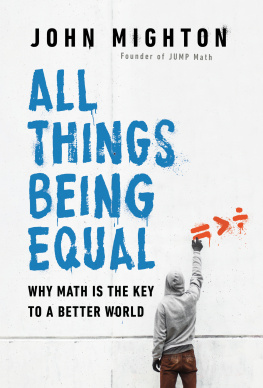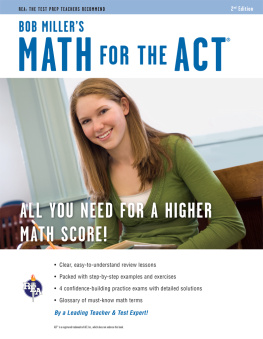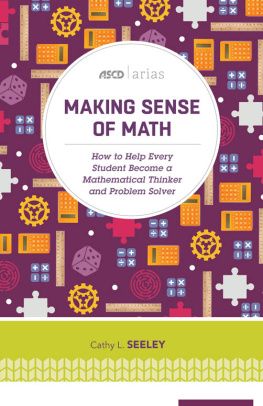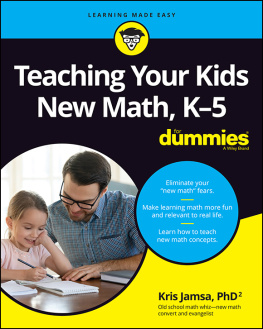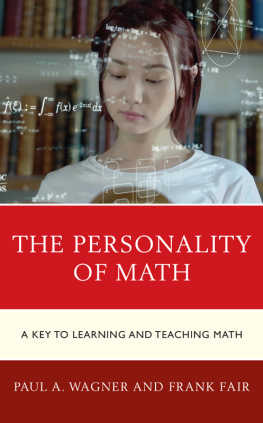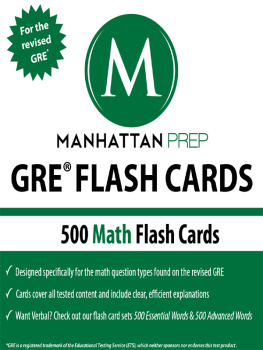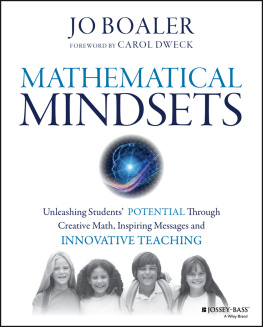PRAISE FOR JOHN MIGHTON AND THE MYTH OF ABILITY
This is a unique book, a remarkable fusion of general insights and specific practices. Teachers will be grateful for its clear and consistent pedagogy, parents will derive concrete help from its practical examples, and education experts will mutter, I wish I had thought of this approach. The myth of ability has been laid to rest and I, for one, am very thankful for it.
Ursula M. Franklin, PhD, FRSC, University Professor Emerita, University of Toronto
Mightons gift is his ability to render difficult problems into steps that he believes students cannot fail to grasp. This skill is evident throughout the text, which is written in prose as lucid and inspiring as Mightons potentially revolutionary approach to a challenging topic.
Quill & Quire
By boldly criticizing the disastrous culture of math failure rooted in too many of our schools, John Mighton reaffirms a neglected justice: the civil right of every student to competent instruction.... Mighton might well become the nations math conscience. He not only knows that all children can master genuine mathematics but has repeatedly proved so with his brilliant, no-nonsense tutoring program.
Andrew Nikiforuk, education writer and award-winning author
The theories outlined in The Myth of Ability have a wonderfully simple logic to them. Its as if John has allowed himself to be back in a childs brain and develop a whole math program that operates from that perspective....
His idea that every child should be able to succeed, and that the aim of good teaching should be to narrow the gap between the weakest and the strongest students is, sadly, a revolutionary one. And his excitement about his idea is contagious.
Annie Kidder, People for Education
John Mighton understands the power of simplicity. He understands patience. He understands the language of maths. His approach to teaching maths is obvious, and no ones ever thought of it before. The Myth of Ability is so fresh that its revolutionary.
John Marsden, award-winning Australian author of the Tomorrow series
THE MYTH OF ABILITY
ALSO BY JOHN MIGHTON
Nonfiction
JUMP at Home Grade 3
JUMP at Home Grade 4
JUMP at Home Grade 5
JUMP at Home Grade 6
Plays
Scientific Americans
Possible Worlds
A Short History of Night
Body and Soul
The Little Years
Half Life
THE MYTH OF ABILITY
NURTURING MATHEMATICAL TALENT IN EVERY CHILD
JOHN MIGHTON

Copyright 2003 John Mighton
All rights reserved. No part of this publication may be reproduced or transmitted in any form or by any means, electronic or mechanical, including photocopying, recording, or any information storage and retrieval system, without permission in writing from the publisher.
First published in trade paperback in 2003 by House of Anansi Press Inc.
This edition published in 2007 by
House of Anansi Press Inc.
110 Spadina Avenue, Suite 801
Toronto, ON, M5V 2K4
Tel. 416-363-4343
Fax 416-363-1017
www.anansi.ca
Distributed in Canada by
HarperCollins Canada Ltd.
1995 Markham Road
Scarborough, ON, M1B 5M8
Toll free tel. 1-800-387-0117
House of Anansi Press is committed to protecting our natural environment.
As part of our efforts, this book is printed on paper that is Old Growth Forestfree, contains 40% post- and 60% pre-consumer recycled fibres, and is processed chlorine-free.
11 10 09 08 07 1 2 3 4 5
Library and Archives Canada Cataloguing in Publication Data
Mighton, John, 1957
The myth of ability : nurturing mathematical talent in every child / John Mighton.
ISBN-13: 978-0-88784-767-7
ISBN-10: 0-88784-767-6
1. Junior Undiscovered Mathematical Prodigies. 2. MathematicsStudy and teaching
(Elementary). 3. Mathematical ability. 4. Children with social disabilitiesEducation.
5. Underachievers. 6. Mighton, John, 1957. I. Title.
QA135.6.M53 2007 372.7 C2007-900076-2
Cover design: Bill Douglas at The Bang
Cover photograph: Terry Vine/Blend Images/Getty Images
Author photograph (p. 211): Chris Chapman
Page design & composition: PageWave Graphics Inc.

We acknowledge for their financial support of our publishing program the Canada Council for the Arts, the Ontario Arts Council, and the Government of Canada through the Book Publishing Industry Development Program (BPIDP).
Printed and bound in Canada
To the students and volunteers of JUMP, whose efforts made this book possible
Contents
Introduction
IMAGINE A SCHOOL WHERE THE FOLLOWING RITUAL IS OBSERVED. At the end of the year, after several days of coaching and preparation, the children are led to a cafeteria where tables have been set with plates of food, one for each child. A government official has inspected the plates; for a given grade each plate holds exactly the same foods, in the same proportions, at the same temperatures. To encourage a feeling of fair play and sportsmanship, the children have been instructed not to touch their knives or forks until everyone is comfortably seated. At a signal from a teacher, the children begin eating, madly trying to stuff as much food into their mouths as they can before a buzzer signals that the meal is over. Afterwards, the children are given a battery of tests to determine how well they are digesting their food.
Now imagine that only those children judged to be superior eaters are allowed to eat a full and balanced diet at school the following year. The teachers at the school, though well-meaning, believe only a few children are born with the capacity to digest food properly; the rest, depending on what kind of stomach theyve inherited, can eat only one or two kinds of food, and even then only in small quantities. When challenged to defend this belief, the teachers point to the vast number of weak and unhealthy students at the school: even those singled out for special attention continue to complain of stomach disorders when placed on restricted diets.
One day people will look back on our present system of education as only slightly more rational or humane than this. A great deal of recent research in early childhood education has begun to show that, with very few exceptions, children are born capable of learning anything. Unfortunately, the existence of this research has done little to change the way children are being taught, at home or at school.
In 1998, when I was in the final year of a doctoral program in mathematics (a subject I had struggled with as a child), I persuaded several of my friends to start an educational charity called JUMP (Junior Undiscovered Math Prodigies). My goal at the time was rather modest. I knew, from my own experience, how easily children could become convinced they were incapable of doing well in mathematics. I wanted to give free, private tutoring in the subject to elementary students from working families in my neighbourhood.
Since its inception in my apartment, with 8 tutors and 15 students, JUMP has grown exponentially; it is now established in 12 inner-city schools in Toronto, with over 200 volunteers and 1,500 students. I expect the program will continue to grow at this pace, in part because the volunteers are not required to have any background in mathematics. Several of our best instructors dropped out of mathematics in high school. Working from a manual I developed for the program, tutors relearn the subject properly as they teach.


